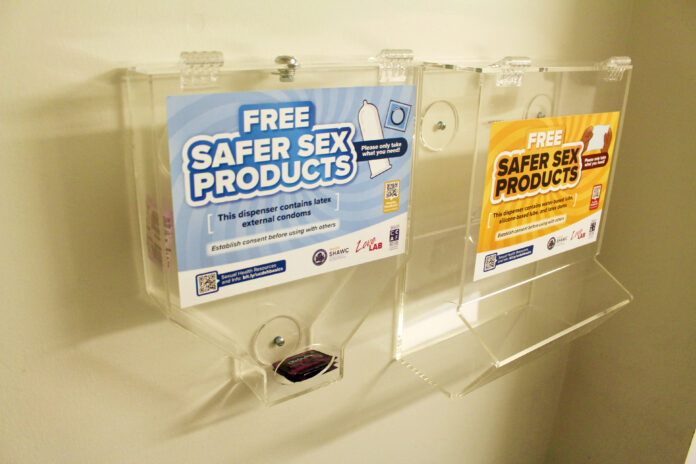Campus health organizations collaborate in effort to promote safer sex and better sex education on campus
By RACHEL GAUER — campus@theaggie.org
Lea este artículo en español.
Earlier this quarter, the UCD Love Lab and ASUCD’s Student Health and Wellness Committee (SHAWC) installed safer-sex dispensers on campus as part of a collaborative project. The four dispensers, which are located in the men’s and women’s restrooms on the second floor of the Memorial Union (MU), contain condoms, dental dams and two varieties of lubricant.
Hibah Shafi, a fourth-year economics major and the current chairperson for SHAWC, spoke about the goals that drove this project and the general concept for the dispensers.
“We just wanted to distribute free safer-sex products and make [them] more accessible,” Shafi said. “We have a good variety of safer-sex products for students to choose from […] and we wanted to make sure that we were as inclusive as we could be.”
The project began last school year when SHAWC received a donation from Planned Parenthood. Shafi explained how this donation led to the early stages of the project.
“We received a ton of safer-sex items from Planned Parenthood and we thought, ‘What do we want to do with these?’” Shafi said. “We thought that maybe we could turn it into a bigger thing, [so] we bounced ideas back and forth and then we thought of [putting] them in dispensers.”
Third-year political science major Sergio Bocardo-Aguilar, a former ASUCD senator and current member of SHAWC, noted that free safer-sex products were available on campus even before this project, but the collaboration aimed to reach a wider variety of students.
“The intention was to make sure that these items are as accessible as possible,” Bocardo-Aguilar said. “We have free items for students who go to the Love Lab in the Student Health and Wellness Center, but not a lot of students know about that, so we wanted to make it more public.”
The team initially wanted to install the dispensers in the gender-inclusive bathrooms on the first floor of the MU, which they believed would be more heavily trafficked. However, the dispensers were ultimately installed on the second floor due to physical barriers that prohibited the installation.
“It was an issue with the tile in the bathrooms,” Bocardo-Aguilar said. “On the first floor, they would have to break the tile to install them, compared to the [drywall] on the second floor[…] where we could just attach them to the wall.”
Blake Flaugher, who oversees the Love Lab and serves as the well-being health promotion specialist at Student Health and Counseling Services, explained how the teams were able to obtain the dispensers.
“Capital City AIDS Fund in Sacramento graciously donated the dispensers as part of their mission to increase access to safer sex products throughout Northern California,” Flaugher said via email.
Flaugher also noted the educational aspect of the dispensers.
“One important piece [of the project] was linking students to sexual health resources through QR codes on the dispensers because we know that sexual health is about more than condoms and dental dams,” Flaugher said. “It is about STI/HIV testing, consent and healthy communication, reproductive health, harm reduction, health equity and so much more.”
On each of the dispensers, there are two QR codes: one leads to additional sexual health resources and the other to a feedback survey for students to recommend any changes or advice for the project. Shafi explained the sexual health guide that students can access by scanning the code.
“We made a safer-sex guide for campus, which is a whole map [showing] where you can access free safer-sex products around campus,” Shafi said. “That guide has become an official campus resource for […] where you can access sexual health resources.”
Though the dispensers were just installed earlier this quarter, they have quickly grown in popularity. Bocardo-Aguilar talked about this unexpected popularity and about the steps the teams hope to take in the future to expand the project.
“Our supply is going out really quick, faster than we expected,” Bocardo-Aguilar said. “Within two days, it’s all gone. I think something we need to focus on next year is getting a lot of funding for this project to be able to consistently stock the dispenser.”
With a larger budget, Shafi said the teams would expand the dispensers to other highly trafficked locations on campus, such as the Silo or student residence halls. Flaugher said that students who want the expansion of the project to succeed can become involved with sexual health organizations on campus.
“Students can make things happen — get involved,” Flaugher said. “We are recruiting a new team of sexual well-being student coordinators in the spring. You can follow @ucdlovelab on Instagram for the latest info.”
Written by: Rachel Gauer — campus@theaggie.org




